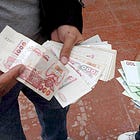Algeria Joins PAPPS: Liberalisation with BRICS Characteristics
Algiers remains cautious of Western ties.
On 1 August, Algeria officially joined the Pan-African Payment and Settlement System (PAPSS), according to an announcement by the system’s governing body. Its accession makes Algeria the 18th African member and places it on par with its neighbours: Morocco, Tunisia, and Egypt. This achievement marks yet another milestone in Algiers’ recent economic liberalisation push, which has seen the North African country move away from its historically ‘closed’ economy towards increased foreign direct investment (FDI), currency relaxation, and proactive bilateral cooperation. Nonetheless, its inclusion in PAPSS reaffirms the country’s commitment to economic autonomy and alignment with non-Western actors.
Aligning with Africa
Algeria’s recent economic liberalisation push, which has intensified in recent months, is driven by both domestic pressures and regional ambitions. Its integration into PAPSS marks a pivotal step, aligning Algiers with fellow North African members in a system that enables low-cost, real-time cross-border payments in local currencies - significantly reducing reliance on Western-dominated financial infrastructures.
This move complements a broader set of reforms, including the 2024 launch of the Investor’s Digital Platform to attract foreign direct investment, and the gradual relaxation of currency controls including a July policy allowing limited euro exchanges for foreign travel at Bank of Algeria branches.
These reforms aim to address Algeria’s urgent need to diversify its hydrocarbon-dependent economy, which currently accounts for 95% of export revenues, amid volatile oil prices and mounting pressure on foreign exchange reserves. By joining PAPSS, Algiers not only facilitates intra-African trade under the African Continental Free Trade Area (AfCFTA), but also reinforces its commitment to economic autonomy: aligning with non-Western actors such as Afreximbank and the African Union to assert greater control over its financial and trade trajectory.
Rare Earths, Finance, and BRICS Aspirations
Integration into a wider African financial infrastructure not only modernises Algeria’s financial system but could also unlock its potential in the rare earth elements sector. Algeria is estimated to hold around 20% of the world’s rare earth elements, yet it has long struggled to capitalise on this due to inadequate infrastructure: financial, regulatory, and technological.
This financial upgrade may also strengthen Algeria’s appeal to non-Western partners, particularly China, which already holds extensive investments across the African continent. Beijing controls a substantial share of the world’s critical minerals — a position attracting growing scrutiny, as it affords leverage over the US military supply chain. The People’s Republic has already undertaken preliminary exploration of Algeria’s lithium reserves, and Chinese firms are negotiating exploration permits for other minerals like copper, lead, and zinc, potentially extending to rare earth elements. Cultivating this resource base could place the North African country in the middle of US-China rivalry, adding another layer of strategic significance to its economic reforms.
Algiers’ continued cautiousness is evident in its bilateral talks with BRICS-aligned countries on investment, as well as in its modest steps towards currency reform. Joining the Pan-African financial infrastructure builds on this intention, and steps like joining the New Development Bank last year. Similar measures may be moving Algeria one step closer to potential BRICS membership.





